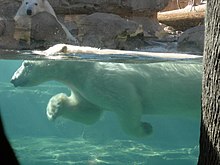User:WhatamIdoing/Subjectivity in Wikipedia articles
A certain amount of subjectivity in Wikipedia articles is required by the Wikipedia:Neutral point of view policy.
The real world is complicated, so excluding all subjective information would result in incomplete articles and violate the WP:YESPOV policy. However, if you want to address someone else's concern, it's best to start by trying to figure out what the person actually means. Often, when editors object to "subjective" information in articles, they meant they wanted to favor information that originates from sources with no conflict of interest, or that they hope for indisputable, precise, unbiased, simplistic, or universal information. It may be helpful to read the related Wikipedia articles on Subjectivity, Objectivity (philosophy), Objectivity (science), Objectivity (journalism), and Universality (philosophy).
Simple example of subjectivity
[edit]
A statement is subjective if the truth value of the statement depends upon who is saying it. Here's a simple example:
- Question: How cold is too cold to go swimming?
- Answer: The correct answer depends on who is going swimming.
The answer to this question depends on who is swimming – the subject in the sentence that says who is going swimming. If changing the subject from, say, "athletic teenagers" to "frail elderly people" or to "babies" causes the correct water temperate to change, then the answer to the question is subjective.
Fans of polar bear plunges or other forms of winter swimming would say that as long as the water is still liquid, it's warm enough to go swimming. Competitive distance swimmers might say that the water needs to be at least 61 °F (16 °C). Leisure swimmers might say the water needs to be at least 77 °F (25 °C). Instructors of infant swimming classes might say the water needs to be at least 84 °F (29 °C).
None of these people are wrong. All of these statements are true. All of the temperatures given in this example are correct and science-based. They're just not universal, because the abilities and behaviors of the different subjects vary. The correct answer depends on who is going swimming. The answer to "How cold is too cold to go swimming?" is therefore always subjective.
Objectivity is not everything
[edit]Objectivity is closely aligned with universality. It is universally true that water temperatures below freezing are too cold to go swimming, because you can't swim through solid ice. But as long as the water is liquid, universality is not an option. It is a hard and fast "objective" fact that cold water swimming is well tolerated by some swimmers. It is an equally hard and fast "objective" fact that the same temperature of water could kill some other swimmers. When human experience varies – when what's dangerous to one group of swimmers is fine for another group of swimmers – then a neutral Wikipedia article should acknowledge the fact that different subjects have different experiences as being a fact. Editors should present the differing viewpoints of different subjects instead of incorrectly presenting one subject's viewpoint as the universal "objective" truth and omitting the viewpoint of other subjects.
While some swimmers can tolerate near-freezing water, it is unsafe for babies to swim in such cold water.
It is safe to swim in near-freezing water.
Subjective is not a fancy word for an opinion. It is not "just an opinion" that babies will die if they spend more than a few minutes in water at 40 °F (4 °C); it is a fact that this temperature is too cold for them to go swimming. Actual opinions, such as whether an individual personally enjoys a given temperature, are not the same thing as different people having different needs or different experiences. If there are differing opinions, then a neutral Wikipedia article should assert facts about those opinions, without claiming that the opinions are either true or universally held.
Members of the Polar Bear Plunge Club say that they find a brief swim in near-freezing water to be fun and exciting.
Swimming in near-freezing water is fun and exciting.
Precision is not the same as objectivity
[edit]61 °F (16 °C) is a precise temperature. But whether it's a good temperature for swimming still depends on who's getting in the water.
Neutrality requires some subjective information
[edit]Address subjectivity when writing the article
[edit]If 61 °F (16 °C) is an acceptable temperature for adult swimming races, then write "It's warm enough for open water swimming competitions according to U.S. Masters Swimming" – not "It's warm enough". If that same temperature is too cold for babies to go swimming, then write "It's too cold for babies" – not "It's too cold".
